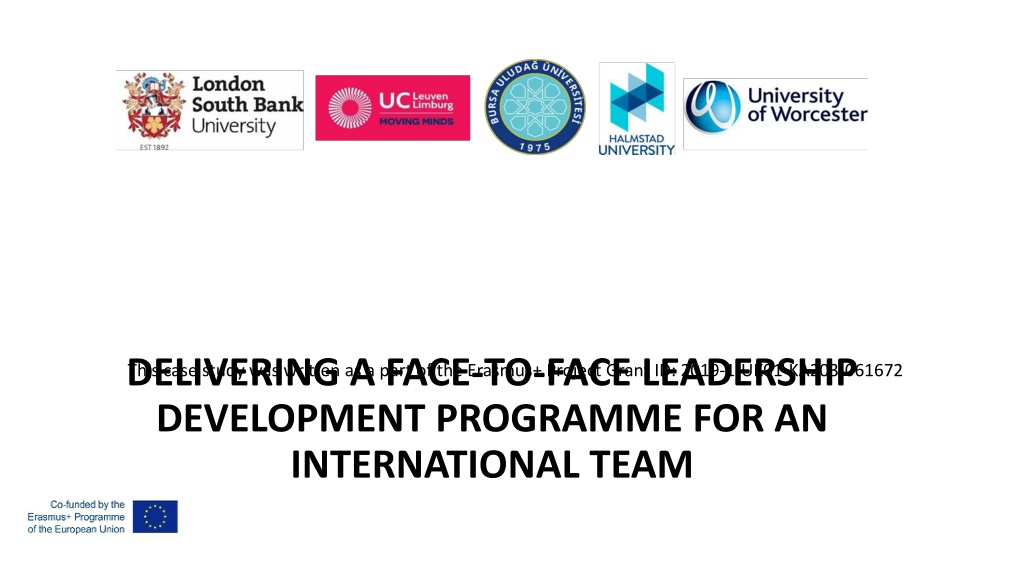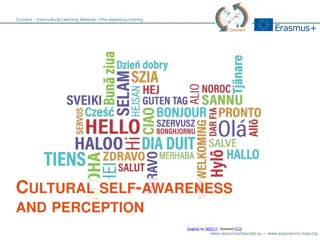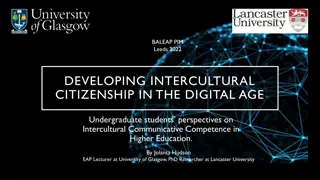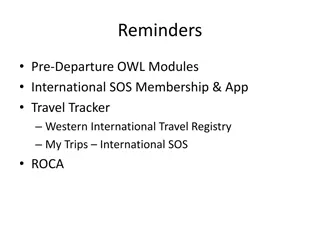Intercultural Skills in Leadership Development Programme
Case study exploring the importance of intercultural skills for senior managers in an international team, focusing on cultural empathy and effective business interactions. Questions posed address differing perceptions and strategies for demonstrating cultural empathy. References provide insight into empathy research and its significance in diverse settings.
Download Presentation

Please find below an Image/Link to download the presentation.
The content on the website is provided AS IS for your information and personal use only. It may not be sold, licensed, or shared on other websites without obtaining consent from the author.If you encounter any issues during the download, it is possible that the publisher has removed the file from their server.
You are allowed to download the files provided on this website for personal or commercial use, subject to the condition that they are used lawfully. All files are the property of their respective owners.
The content on the website is provided AS IS for your information and personal use only. It may not be sold, licensed, or shared on other websites without obtaining consent from the author.
E N D
Presentation Transcript
DELIVERING A FACE-TO-FACE LEADERSHIP DEVELOPMENT PROGRAMME FOR AN INTERNATIONAL TEAM This case study was written as a part of the Erasmus+ Project Grant ID: 2019-1-UK01-KA203-061672
Teaching Objectives Students/learners will be able to: Understand the meaning of cultural empathy and discuss its importance when working with people from other cultures. Reflect on their own culture and engage in a dialogue with people from other cultures to highlight the similarities and the differences in cultural actions and behaviours in a business setting. 2019-1-UK01-KA203 061672
The Case Study Read the Case Study provided and consider the following questions: 1. Why are intercultural skills in employees and senior managers important in Insurance Co? 2. Why did the senior managers from the UK, Bulgaria, Costa Rica and Hong Kong have different perceptions over actions and behaviours during the first day of the leadership development programme? 3. What is the importance of cultural empathy for intercultural interactions in a business environment? 4. How would you go about in delivering the next leadership development programme so that you can demonstrate the meaning and significance of cultural empathy to the international participants? 2019-1-UK01-KA203 061672
References Duan, C., & Hill, C.E. (1996). The current state of empathy research. Journal of Counseling Psychology, 43(3), 261-274. Hollan, D. (2012). Emerging issues in the cross-cultural study of empathy. Emotion Review, 4(1), 70-78. Solhaug, T., & Osler, A. (2018). Intercultural empathy among Norwegian students: An inclusive citizenship perspective. International Journal of Inclusive Education, 22(1), 89- 110. Wang, Y.W., Davidson, M.M., Yakushko, O.F., Savoy, H.B., Tan, J.A., & Bleier, J.K. (2003). The scale of ethnocultural empathy: Development, validation, and reliability. Journal of Counseling Psychology, 50(2), 221-234. Young, C.A., Haffejee, B., & Corsun, D.L. (2018). Developing cultural intelligence and empathy through diversified mentoring relationships. Journal of Management Education, 42(3), 319-346. 2019-1-UK01-KA203 061672





























